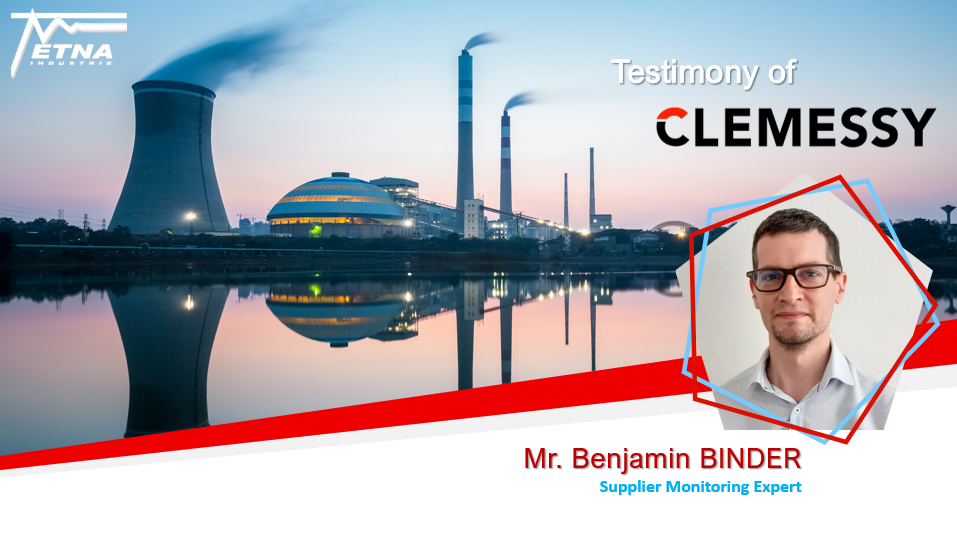Interview with Mr Benjamin BINDER, Supplier Monitoring Expert at CLEMESSY

You joined Eiffage Energie in 2015. We met you in your role as a supplier monitor. Since then, your post has been upgraded to Expert Supplier Monitor.
- Can you tell us how you see your role?
My past work experience was closely connected with the nuclear environment and Quality Management systems. I began as a radioprotection technician in the medical environment (x-ray technology in hospitals and general radiology, dentistry), and after further study and specialist qualification in nuclear engineering and Quality systems, I began working as a Quality Manager. I then joined EES-CLEMESSY Nuclear as a member of the Diesel Ultimate Back-Up project.
The disciplined working methods acquired in the Nuclear Safety field were valued when I joined the Supplier Monitoring team and came into contact with you people from ETNA-Industrie.
As an expert in EES-CLEMESSY I expanded my scope to cover the broad range of the nuclear industry. Thus, I am extensively familiar with its suppliers and products, and constantly in contact with nuclear industry representatives.
Exchange of know-how is critical. And that must be grounded in good personal relations. My job is an enriching one, both personally and technically.
ETNA Industrie has more than 40 years’ experience in the nuclear industry and nearly 80 in fluid regulation.
Eiffage Energie has selected ETNA Industrie as a supplier of equipment qualified to cope with breakdown conditions.
- What were your selection criteria?
ETNA Industrie and EES-CLEMESSY Nuclear began working together as far back as the 1980s on the supply of regulation and overflow valves for the CHOOZ and CIVAUX nuclear power stations. The compressed air regulation equipment installed is still operational.
Long term positive feedback and consistent performance records are among the first criteria when assessing products.
We are closely acquainted with ETNA Industrie and its technically rigorous processes. Our decisions to source from them rely on our knowledge of their qualification procedures, itself based on the detailed exchange of technical information.
As part of a 3-year project, we designed special products compliant to your detailed specifications.
- How would you describe the ETNA Project Management approach and capabilities?
We identified three main contacts in the ETNA Industrie product team. For progress monitoring, M/s SELVARADJOU, for Quality monitoring M/s FAULQUES, and Mr BOUVIER for Studies and Design.
Clear definition of roles meant our exchanges of information were fluidified and simplified.
ETNA team members devote the necessary time to understanding our requirements. They have proven their ability to generate technical and organisational solutions that exactly meet our needs.
From the customer point of view, the time taken by ETNA to think solutions through can appear slow progress. But thorough working methods have proven their worth, so that outcomes are fully constructed, clear and feasible both in production and on installation. Above all, solutions meet the stringent needs of Nuclear Safety.
Nuclear industrial projects are time-consuming and require rigorous working methods as well as technical expertise. We at ETNA Industrie have been able to rely on the knowledge and support of Eiffage Energie people when making joint progress towards project completion. We are proud of the collaboration down the years between our two companies.
- In your view, what were the main challenges of this collaborative approach?
The biggest challenge in my view is achieving an all-embracing view of the related aspects of projects when they generate complexity over long periods. Needs have to be clarified and explained, because of the inherent initial differences between intellectual and technical approaches. We have to learn to work together and develop effective communication skills if we are to meet specifications.
- What do you most remember about our years of collaboration?
We have made numerous visits to your production site at Argenteuil and I am in personal contact with your production teams. Mr ECARD, who has probably tested the full range of the products he supplies to us, sees me as a frequent visitor to his test facilities.
Additionally, I have witnessed changes in your design and production methods, as you evolved towards an Open Space working environment.
You have controlled the quality and performance of our products.
- How do you rate them?
Entirely satisfied. ETNA sourced products are currently in operation in 36 nuclear units.
Today, we are jointly responding to the challenge of meeting new original equipment specifications, while we continue to monitor devices and components after their qualification and installation in operating conditions.
- What in your view are the “must have” qualities for sustainable collaboration?
Responding to evolving needs is fundamental to both our companies, so that each must change its organisation, its production facilities and its human resources.
When these changes are implemented, the real challenge is to ensure rigorous verification of invariable standards of the performance of equipment throughout its full serviceable life in the French nuclear installed base.
Communication is a key factor. We need to maintain a constant and two-way flow of information. This is based on direct contact between all involved in the demanding work of validating and recording performance standards, whether embodied in Electricité de France’s Nuclear Excellence Plan, or in the EPR2 project, or by way of the integration of ISO 1944 requirements.
This entry was posted in Testimony on .

Become first to comment !